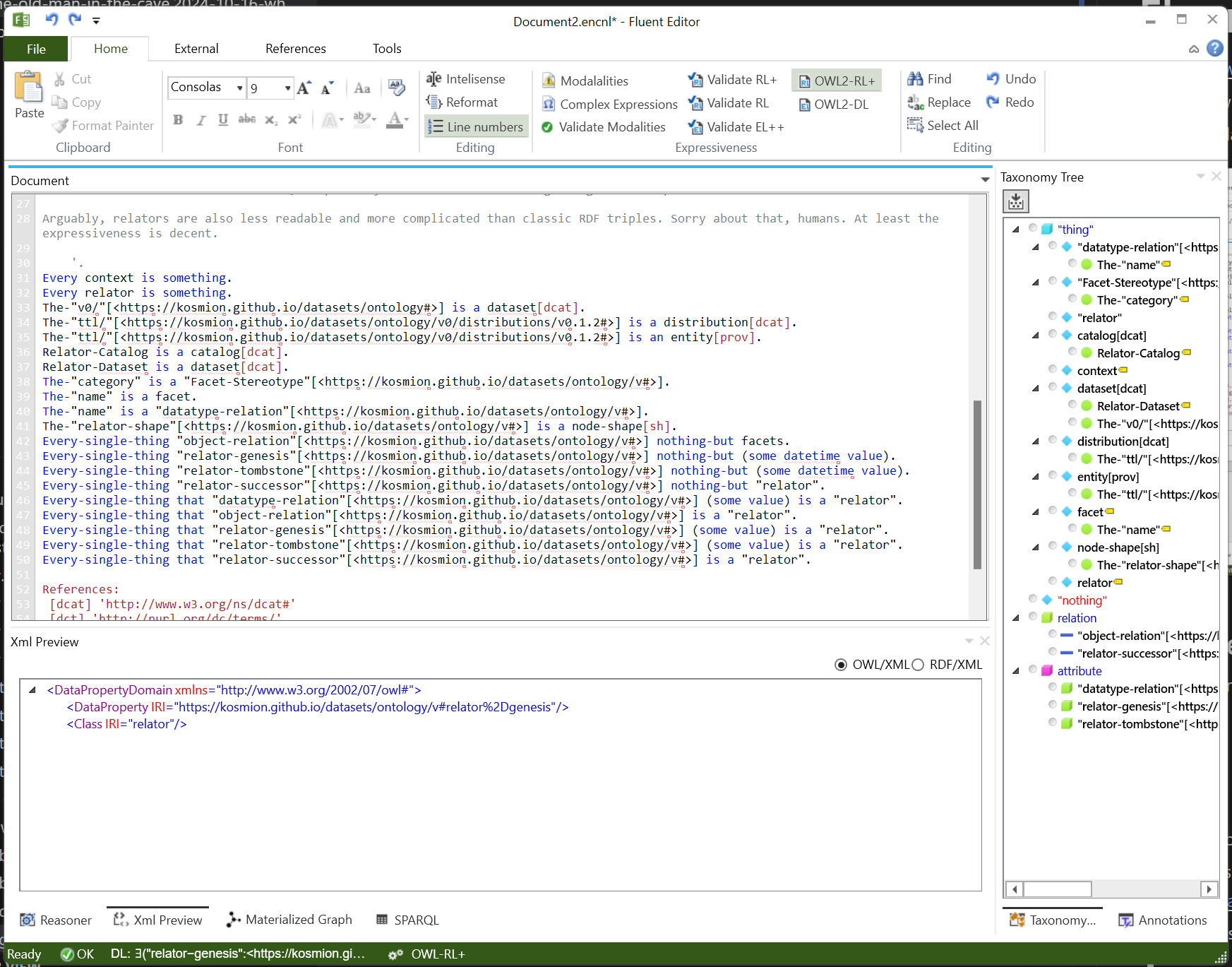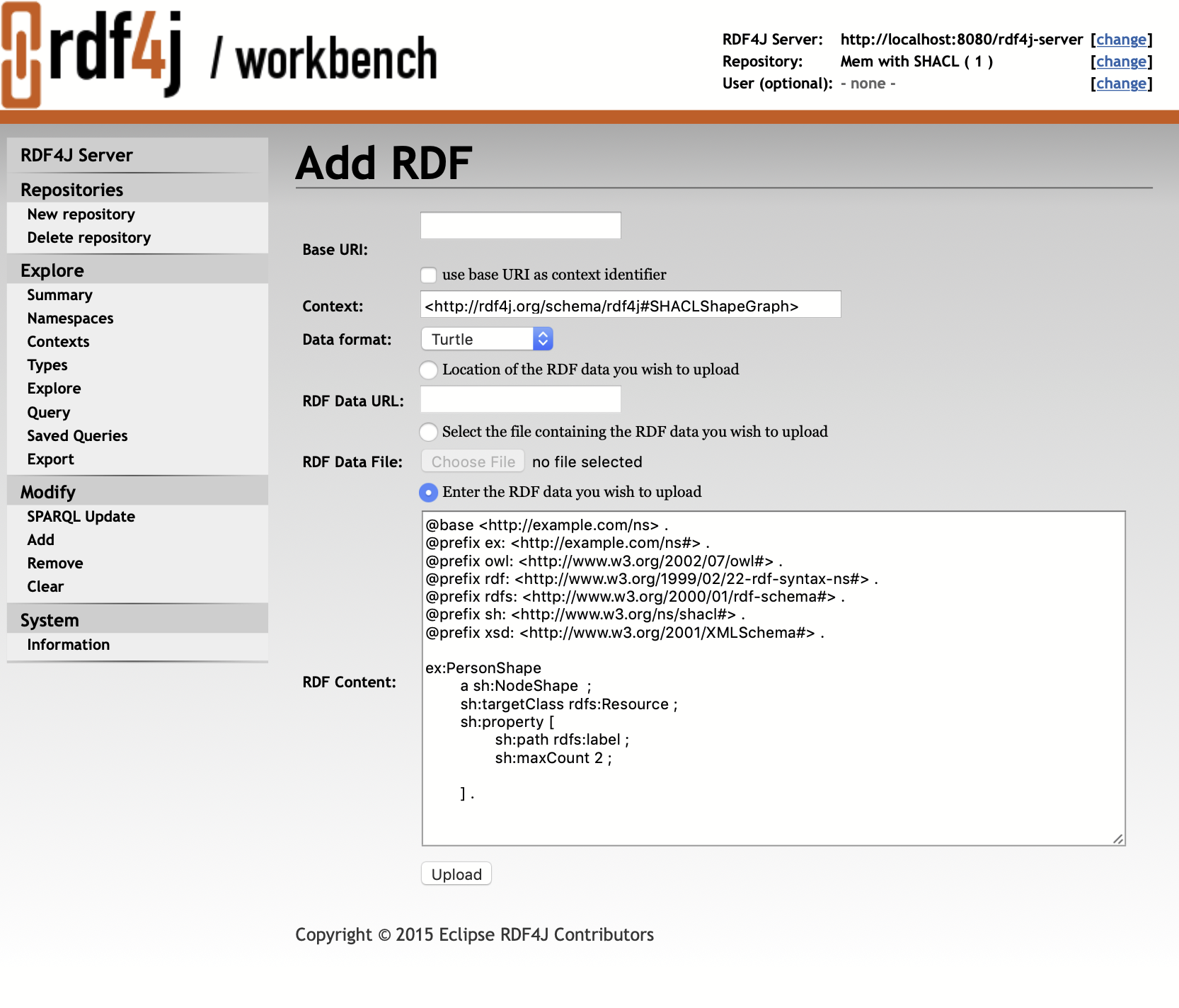2024-10-18: What’s the Best Semantic Web Authoring Tool? desc: a grim survey of RDF data management apps
a grim survey of RDF data management apps
So I was chomping at the bit on a foundational ontology with accompanying example data. Let me just open my go-to RDF tools...
The Usual Suspects
VSCode and JetBrains
I’ve been composing little bits of raw RDF in Turtle “by hand” with my preferred text editor all-time-favorite software, VSCode. Turtle is the most human-readable of the various RDF syntaxes and with the handy Stardog RDF extension for syntax checking and highlighting, the experience is pretty good.
If you prefer the Jetbrains IDEs, apparently the Rdf and Sparql extension plugin is the best thing since sliced arrays. For €5 / month, you can query local RDF files with SPARQL. Pretty cool!
I wouldn’t recommend either path for non-coders though. And I’ve definitely found myself wishing for a more purpose-built tool.
Protégé
For a little GUI goodness, there’s the hallowed and venerable Protégé “ontology editor.” In the words of Phil Lord, it’s “the Excel of the ontology world.”
I put ontology editor in quotes here because there’s been an annoying blurring of the line between ontologies (i.e., conceptual schemas, also known as the “terminologic box” or t-box) and the facts and entities that use ontologies, aka instance data or the “assertional box” or a-box. I know it can be a hard line to draw, but apparently everything’s an ontology now. Better to call everything “RDF data” than to call everything an ontology, IMHO.
Anyhow, I know Protégé is commonly used for authoring instance data. Maybe most of the people who create ontology-conforming instance data by hand are the same people who created the ontologies. If the tool you know works, keep using it, right?
Probably the biggest reason is that there aren’t really any other options.
But Protégé doesn’t have source editing. It’s also complicated and intimidating. It’s just not ideal for actual data management. So let’s at least have a look around.
Topbraid Composer
Topbraid Composer is the other well-known GUI tool for the Semantic Web, but the free edition was discontinued in May 2020, and the paid “Maestro Edition” is $3450/year and no longer actively developed. TopQuadrant is focusing on Topbraid EDG which has neither a free version nor public pricing.
For me, not being able to see the source for more than one element at a time is disqualifying, but maybe I was just doing something wrong. Also, the old free edition didn’t seem to work with Trig (the “named graph” superset of Turtle), which might be a major issue for me. And like most products based on the Eclipse IDE, learning Composer might be a challenge for non-programmers.
Even so, Composer Free might be your best option for affordable, GUI-based RDF data management. You can find the slightly-hidden download here.
A Frustrating Search
I started looking for a friendlier, purpose-built authoring tool. Surely there’s something that allows you to browse, create, and update RDF data with a GUI!? Like Datagrip, but for the Semantic Web. I mean, people have been doing this for 25 years!
You would expect a user-friendly data management app to have a simple means of entering and updating data. Helpful graph and hierarchy visualizations would be nice. It should also have guardrails:
- consistency checks
- a revision history or per-object undo mechanism
- wizards and other user-experience affordances for common workflows like setting up projects, commiting changes, and publishing datasets
A lot of tools interface with RDF data via Sparql, so require backing from a compliant triple store. I’m envisioning using git to store RDF data, so for that use case an authoring tool has to work with text files. Ideally, I’d want a stand-alone application that you can run disconnected on a laptop. (Local-first forever!)
There must be some good options, right?
Fluent Editor
The only stand-alone alternative to Protégé and Composer that I could find was Fluent Editor. It’s quirky, doesn’t have direct source editing that I could find, and hasn’t been updated since 2015. I love the idea of using Controlled English for knowledge modeling, but LLMs are poised to do that in any language, controlled or not.

Fluent Editor was definitely ahead of its time, but I’d be suprised to hear of anyone using it in 2024.
Reddit To the Rescue?
While researching this article, I stumbled on a recent “reddit post entitled Best Ontology Development Environment Tool?”. Daniel Bakas of Best RDF triplestore/graph database? fame mentioned he’s looking for tools suitable for “high-impact big scale projects.” Whatever the scope, his considerations are largely the same as mine.
Atomic
One of the threads in Daniel’s post, from the creator of Atomic Data, Joep Meindertsma, mentioned Atomicserver.
Atomic Data is an exciting RDF-based alternative to the conventional semantic web. I particularly love its use of Event Sourcing.
According to Joep, Atomic Server “now has an ontology editor with a nice UI, even shows the UML diagram.”
Sounds great, but...
I have some hesitations about the Atomic approach, especially in view of my democratized alternate realities use case. Primarily, it is too restrictive about being able to say anything about anything. My users have to be able to pick up other peoples’ content and riff on it.
Another restrictive aspect of Atomic is that all data requires validation with an Atomic Schema before it’s stored on an Atomic-compatible service. I want something flexible where data can be created by hand, stored in Git repositories, and get forked easily.
Still, I admire the ambition, love the strategy, and depending on your use case, it might work for you.
Overkill Options
The Reddit thread mentioned a few other web-based possibilities: LinkedDataHub, Metaphactory, and Semaphore. They’re more platforms than authoring tools.
LinkedDataHub is an impressive, web-based, open-source Knowledge Graph platform that deserves an article of its own. Its target audience includes “researchers and data scientists” and “developers and data publishers.“ It inspires you, as a developer, to base your application on it. But while it could be used for authoring RDF data, that is not its focus. As an authoring too, it is probably overkill.
Metaphactory is similar, but not open-source. And pricing isn’t cheap, “starting from $13.03/hr or from $52,900.00/yr” on AWS.
Semaphore is probably expensive and definitely overkill.
The consensus in the Reddit discussion seemed to be: if you’re comfortable using an IDE, making RDF data by hand is probably your best option.
Anything Else?
VocBench
VocBench might be the best web-based option. You can install it locally and it seems to have caching and other support for mixing local development with connected resources. It has options for history, validation, and undo. But it doesn’t seem to have a source editor and it has some other limitations.
Open Link Structured Data Editor
There’s also the Open Link Structured Data Editor (OSDE), which hasn’t seen an update in two years and doesn’t work with text files.
Stardog
Stardog Studio looks slick and might fit the bill for an authoring tool if it worked with text files or even non-Stardog triple stores. I love that they have a free cloud offering though, and am forever grateful for the VSCode extension.
Fluree
prdct.Fluree-db (Private) is an inspiring take on RDF graph databases, with immutability and time travel. I keep eyeing Fluree because of its potential as a game-changing graph database. The Fluree cloud offering, Nexus, has a modern GUI for data management. Like Datadog Studio, it doesn’t support text files or other triple stores.
rdf4j Workbench
Finally, there’s rdf4j Workbench. If you’re not familiar with Rdf4j, it’s the Eclipse Foundation’s open-source triple database, analogous to Apache’s Jena with its Fuseki SPARQL engine. (The Fuseki web UI doesn’t support text editing.)
In terms of rdf4j’s source support, you can enter RDF directly into an HTML <textarea>.

A picture is worth a lot of words here, but I’ll spend some anyhow: If your text-oriented application has to be web-based, please use Monaco Editor.
Solid?
At this point, I should probably mention Solid, an initiative/specification/platform that lets people store their data securely in decentralized data stores called Pods. The vision is data is decoupled from applications, so that people are no longer locked into specific platforms simply because their data is held there.
It’s similar to Atomic Data and also exciting and ambitious, with a large and active developer community and commercial backing to boot. But while Solid is built on RDF, it’s not viable as a general RDF authoring tool.
It could benefit from one though.
Prognosis

The situation is discouraging to say the least.
If we’re going to reboot the semantic web, we’ll want a usable data editor that supports local-first authoring, guided workflows, and data guardrails.
For now, I guess I’ll be sticking with VSCode, but let me know if I’ve missed something. I’d love to be wrong here.
Also, let me know if you’re interested in buildinng or backing a modern RDF data editor! That’s a project I could sink my teeth into.